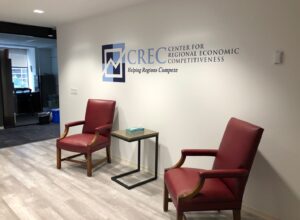Current MPA student Francesco Tassi writes about his Professional Work Experience this summer. Francesco is a current student in the oncampus format of the MPA at UNC. He is originally from Florence, Italy and received his undergraduate degree from the University of Notre Dame. Francesco’s main interest is supporting public organizations that promote the development of distressed regions and workers.
This post was written by Francesco Tassi.
I first heard of my PWE, the Center for Regional Economic Competitiveness (CREC), from Dr. Dabson, a Research Fellow at the School of Government, and in Prof. Morgan’s elective Managing Economic Development. Having researched economic development strategies of North Carolina regional councils for our MPA Research Methods class, I actually ran into CREC’s consulting work for regional councils early on in my MPA. CREC is a nonprofit based in Washington D.C. that develops data products, conferences, policy academies, and consults for states and federal agencies on economic and workforce development. As I write this blog post, I find myself in D.C. about to embark on a new project with CREC to assist the U.S. Economic Development Administration in aligning the state and regional economic development strategies of several states—a far (but related) cry from my MPA research. This summer I helped develop an economic empowerment index to improve the economic mobility of frontline workers in Colorado, modeled the economic impact of Department of Defense (DoD) spending in Louisiana, updated CREC’s state business incentives database for fifteen states (including North Carolina), interviewed Appalachian Regional Commission grantees on best practices for recovery-to-work ecosystems, drafted a weekly newsletter for an association of federal statistical agencies, helped plan and run a federal data conference sponsored by Facebook, and mapped DoD appropriations to strengthen the pipeline between university research and military applications in Texas.
Asides from vastly increasing my knowledge of labor market data (a highlight was informing a successful collaboration on data with Brookings) and related software (IMPLAN, Tableau), CREC’s projects exposed me intimately to a fundamental question every practitioner in the public sector must face—how do we best use and communicate data to inform public organizations? Whether it’s the baseline year for military retiree spending I chose to input into a complex software to inform Louisiana’s legislature, or demographic industry variables debated with colleagues for Colorado’s index—what I cherished was that every decision had input and process. Despite working for a nonprofit, I realized that bureaucratic process, or feedback loops and reviews with clients and colleagues regarding data use and inclusion, is the backbone of all that is good and useful. For both my Texas and Colorado projects I pushed for certain data that took more time to collect. Despite possibly making me the ‘annoying’ intern, I believe this led to slightly more accurate tools for the public sector—which brings me joy.
I’m thankful for Prof. Szypszak teaching us Nexis-Lexis; it came in handy for updating statutes on states’ business incentives. It’s also easy for an MPA student to underestimate their first-year communications class. But when you’re building a 40-variable index for 64 counties and county commissioners, state-level workforce development and higher education departments, as well as industry sector partnerships across Colorado, you fully appreciate that everything needs to be simplified and communicate stories to be useful, despite being complex at its core. Seeing that the work I am helping to create is impacting public agencies, and at the forefront of innovatively tackling economic development challenges across the U.S., is immensely rewarding. Experiencing our nation’s capital despite the lingering presence of COVID-19 has also been a blessing. Commuting every day on the metro is a highlight, something I never thought possible in the age of remote work. I enjoyed my PWE so much that I will continue working with CREC part-time going into my second year as an MPA-MCRP dual degree candidate. I look forward to dive deeper into labor market data, continuously learning from (and deeply thankful for) dedicated colleagues and supervisors at CREC—two of which happen to be Tarheels. Even in D.C. you can’t be too far from UNC!

